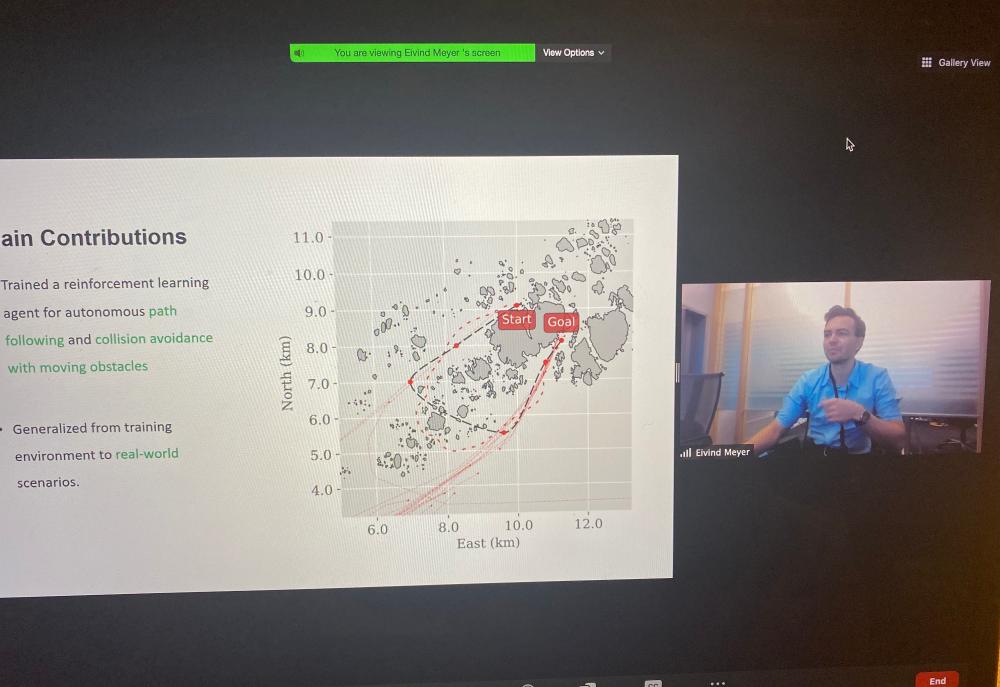AI Master's Thesis Awards 2020

The best AI Master's Theses in 2020 awarded
Artificial Intelligence is a popular topic among students at NTNU. In fact, more than 200 master's students who graduated from the Faculty of Information Technology and Electrical Engineering last year submitted a thesis in which AI plays a substantial part. On December 15th, we celebrated the top AI theses of 2020 in a digital event. Eivind Meyer, a graduate from the Department of Engineering Cybernetics, was the lucky winner of the awards.
In order to identify the best AI theses in 2020, we reached out to the research community at NTNU and asked them to nominate excellent master’s theses within AI. This resulted in the following list of nominations from supervisors across various departments at NTNU:
- Skjalg Winnerdal & August Høyen Moum - Low-resource speech recognition
- Matěj Mňouček - Data-oriented multi-agent assessment system for real-time driving simulators
- Tollef Jørgensen - In a Sentimental Mood: Augmenting Entity-level. Sentiment Analysis with Coreference Resolution
- Navjot Singh - Deep Active Learning for Autonomous Perception
- Erik Liodden - Deep Learning-Based Method for Regional Wind Power Production Volume Prediction
- Eivind Meyer - On Course Towards Model-Free Guidance: A Self-Learning Approach To Dynamic Collision Avoidance for Autonomous Surface Vehicles
- Jakob Martinussen - Three-dimensional Roof Surface Geometry Inference Using Remote Sensing Data
- Amund Tenstad - Deep Evolvable-Substrate HyperNEAT: Extending ES-HyperNEAT with Multiple Substrates in an Evolving Topology
- Ingrid Ravn Turkerud - Image Captioning with Deep Learning
- Herman Kristian Dieset - Approximate Arithmetical Operators for Energy Efficient Inference in Deep Neural Networks
Out of the 10 nominations, the evaluation committee selected the top three theses. The authors of these theses: Eivind Meyer, Herman Dieset and Amund Tenstad, were invited to present their work during the awards event, December 15.
A celebration of AI talents
The event was led by Trym Holter, Director at the Norwegian Open AI Lab, who started off by emphasizing the importance of master’s students and their contribution to strengthening AI in Norway. Trym said he was impressed by the high quality of the nominated theses, admitting that the work done by the nominated graduates had exceeded his already high expectations.
In addition to presentations from the graduates, we heard from last year’s winner of the awards, Håkon Hukkelås. Håkon presented his current PhD work on facial recognition and anonymization, which builds on his master's thesis from 2019 (a previous recording of a similar talk by Håkon can be seen in this video).
Jostein Bø Fløystad, who represented Telenor in the evaluation committee, was also impressed by the high quality of the nominated theses. He admitted that it had not been an easy task to select only three finalists. Telenor is a partner in Norwegian Open AI Lab and was involved in establishing the center in 2017.
The AI Master’s Thesis Awards is a result of the collaboration between NTNU and Telenor within AI. Telenor's involvement and sponsorship of the awards event is just one great example of their commitment to talented NTNU students.

The winner thesis demonstrates potential impact on Norway's marine industry
Eivind's thesis on dynamic collision avoidance in autonomous surface vehicles is a great contribution to the field, and represents a small step towards autonomy in marine transportation expected to have a significant impact on the Norwegian marine industry and society at large. Eivind received a prize of NOK 20 000, while Herman and Amund both received 10 000 NOK prizes.
Congratulations to the three winners of the awards!

